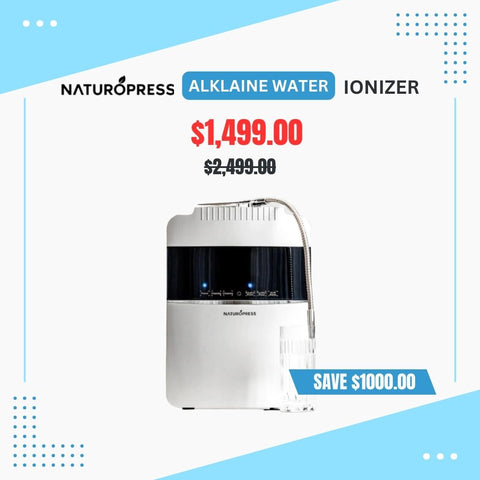Alkaline water is making waves in the health industry, touted for its potential benefits beyond regular hydration. But what sets alkaline drinking water apart from tap or bottled water? This article dives deep into the science and health benefits of this unique type of water. From its pH levels to how it affects our body's hydration and health, we uncover why alkaline water might be worth incorporating into your daily routine.
What is Alkaline Water?
Alkaline water is a liquid with a pH level that is higher than normal water. For a more in-depth look into pH levels and how they differ in various types of water, see water pH levels. Most drinking water has a neutral pH of 7, which is normal. Alkaline water, on the other hand, usually has a pH of 8 or 9. On the pH scale, which goes from 0 to 14, anything above 7 is called alkaline and anything below 7 is called acidic. So, alkaline water is basically less acidic than regular water.
How Do You Make Alkaline Water?

Natural spring water can sometimes be alkaline due to minerals it absorbs from the earth. Curious about the difference between alkaline water and spring water? Check alkaline vs spring water. However, most commercially available alkaline water is produced using an ionizer. This device uses electricity to separate water molecules into acidic and alkaline components. The alkaline component becomes ionized alkaline water. For a high-quality ionizer, consider checking out this alkaline water ionizer from Naturopress. Curious about the difference between alkaline water and spring water?
Does Alkaline Water Offer Better Hydration?
There's a growing belief that alkaline water provides greater hydration than regular water. Some studies suggest that drinking alkaline water can improve blood viscosity, which essentially means it can hydrate our bodies more efficiently than regular water. This could be beneficial for athletes or those in high-intensity professions. Check out the topic alkaline water for hydration to understand further.
Health Benefits of Alkaline Water: Fact or Fiction?
Many claim that alkaline water offers a plethora of health benefits, from neutralizing acid in your body to promoting bone health. Some research even suggests that alkaline water might help slow down the aging process and regulate your body's pH levels. But these claims need to be backed up by more study. It's important to think critically about health claims about alkaline water.
Is Alkaline Water Safe to Drink Regularly?
Generally, consuming alkaline water is considered safe for most healthy adults. However, like many things, moderation is key. How much alkaline water should you drink every day? Find out here. Overconsumption might alter the acid levels in your stomach, impacting the digestion process.
Does the U.S Recommend Alkaline Water?
The U.S, like many other countries, recognizes the importance of hydration. However, specific recommendations on alkaline water aren't prevalent. The consensus seems to be that more research is needed before definitive guidelines can be set.
How Does Alkaline Water Affect Bone Health?
Some proponents suggest that alkaline water can combat bone loss. Wondering about the effects of alkaline water on other aspects of health? See its potential benefits for UTI or its impact on hair. The logic is that it can help neutralize the acid in your body, which can otherwise leach calcium from your bones. However, research to support these claims is still in its early stages.
Alkaline Water VS Regular Drinking Water: A Comparison
Both alkaline and regular water serve the primary purpose of hydration. Compare alkaline water vs. regular drinking water here. The main difference lies in their pH levels, with alkaline water having a higher pH. There's also a belief that alkaline water can offer improved hydration due to its molecular structure. But when it comes to general hydration needs, both types of water should suffice.
Potential Pitfalls and Myths about Alkaline Water

While there are potential benefits to drinking alkaline water, there are also myths. Some believe it can aid in weight loss, offer antioxidant benefits, or cure chronic diseases, but the evidence to support such claims is sparse. It's essential to differentiate between proven benefits and marketing myths.
Making the Right Choice: Which Water to Drink?
Choosing the right type of water to drink comes down to personal preference and individual health needs. Alkaline water might help in some ways, but it's not a cure-all. Stay informed, do your study, and always put hydration first, no matter what the pH level of the water is.
Final Thoughts:
- Alkaline water has a higher pH level than regular drinking water.
- It might offer improved hydration due to its molecular composition.
- The health benefits of alkaline water are still being researched, and it's crucial to approach claims critically.
- Always prioritize hydration, regardless of the type of water you choose to drink.
FAQs: All About Alkaline Water
- What is the pH of pure distilled water? Pure distilled water has a neutral pH of 7. However, when exposed to the atmosphere, the pH might change slightly due to the absorption of carbon dioxide, making it slightly acidic.
- How does tap water's pH compare to distilled water? Tap water's pH can vary based on various factors, including the water source and treatment processes. In general, tap water can have a pH between 6.5 and 8.5, while distilled water starts with a neutral pH of 7 but can become slightly acidic upon exposure to air. Learn more about acidic water and its uses here.
- What do the terms "high pH" and "low pH" signify about water quality? High pH refers to water that is more alkaline, and low pH indicates water that is more acidic. A pH of 7 is considered neutral. The quality of water can be affected by its pH level, especially if it's too high or too low. Extremely high or low pH can indicate contaminants or imbalances in the water.
- Why does the pH of water matter? The pH is a measure as it affects various aspects of water quality. Water that's too acidic or alkaline can have harmful effects on pipes and water systems, leach unwanted substances into the water, and can even impact organisms living in the water. Explore more benefits of alkaline water here.
- How does hard water relate to pH levels? Hard water typically contains higher concentrations of minerals like calcium and magnesium. While hard water itself doesn't directly affect the pH, the minerals present can interact with other ions in the water, potentially influencing its pH. Discover how to use alkaline water in cleaning here.
- Is drinking water with a pH of 8 or 8.8 harmful? Water with a pH of 8 to 8.8 falls into the alkaline range. Drinking alkaline water can be beneficial for some people, especially as an adjunct to neutralize stomach acid. Boost your immunity with alkaline water and learn more about the daily intake here.
- How can one test the pH level of their drinking water? You can test the pH of your drinking water using a pH test kit, commonly available at home improvement stores or online. Choose the best alkaline water filter for continuous monitoring.
- What does it signify when the pH of water drops? When the drinking water pH decreases, implying a shift towards a lower pH, the water is tending to become more acidic. Such a shift could indicate that the water may have contaminants or disturbances in the water balance. Experts from water science schools often recommend analyzing the water sample if there are abrupt and prominent alterations in its pH levels.
- Why is a pH range from 6.5 to 8.5 recommended for drinking water? Drinking water pH levels between 6.5 and 8.5 are typically seen as desirable. This is because water within this pH range isn't too acidic (pH below 7) or overly alkaline (higher pH). Such a balanced pH ensures that the water is not too aggressive to leach substances into it from pipes, remains palatable without an adverse taste, and maintains conditions that are hospitable for aquatic life. Learn more about hydrogen water benefits.
- Is it possible to find natural water with a pH of 0 or 14? In natural settings, encountering a pH of 0 or 14 in a sample of water is extremely rare. Such extremities in pH levels indicate water that is times more acidic than typical acidic water or extremely alkaline, respectively. The natural alkalinity and pH interactions in the environment, coupled with buffering agents, generally resist such drastic changes, keeping most natural waters in a relatively neutral range. Explore more about cooking with alkaline water and how it can enhance your culinary experience. For more insights and products related to alkaline water, visit Naturopress.



